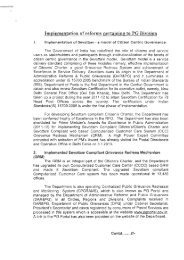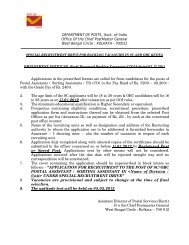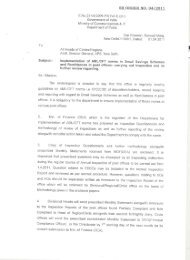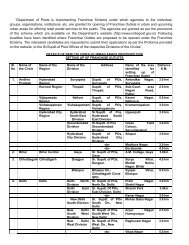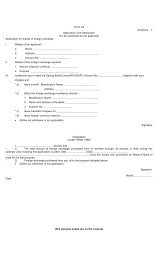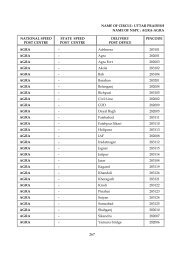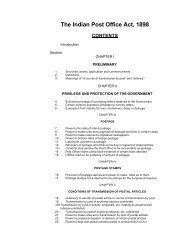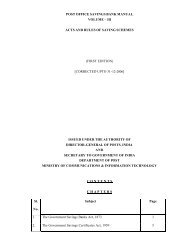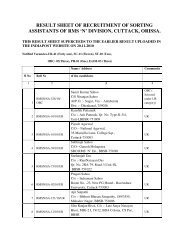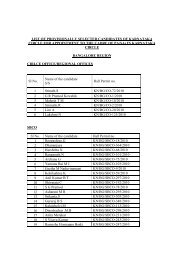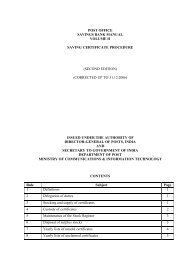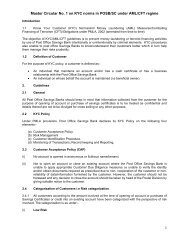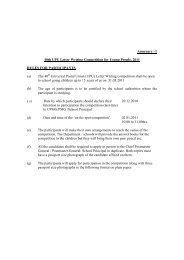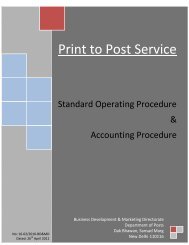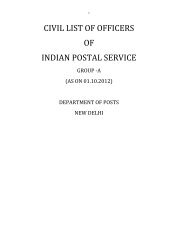Post office guide part i - India Post
Post office guide part i - India Post
Post office guide part i - India Post
You also want an ePaper? Increase the reach of your titles
YUMPU automatically turns print PDFs into web optimized ePapers that Google loves.
frequently utilized denominations for sale to the rural public. They also, keep a stock of the<br />
commonly required postal forms like acknowledgement forms. Money Order forms may also be<br />
obtained from them on payment of ten paise for each form. Village postmen are, also, authorized<br />
to book registered letters and post cards tendered to them for dispatch for which a receipt will be<br />
issued by them and to collect letters tendered to them for dispatch.<br />
92. Issue of <strong>Post</strong> Office Forms. – The forms prescribed for the various transactions can be<br />
obtained from the <strong>Post</strong> Office. <strong>Post</strong> Offices will issue only the reasonable requirements of the<br />
forms actually needed for immediate postal transactions. For the convenience of firms and other<br />
institutions requiring large quantities of <strong>Post</strong> Office Forms in connection with their business, books<br />
of the more commonly used forms are available for sale at a nominal price at all principal <strong>Post</strong><br />
Offices. Forms of acknowledgement for registered articles are supplied in books of fifty forms at<br />
nominal price.<br />
93. Services which cannot be claimed. – <strong>Post</strong> Office officials are absolutely forbidden to<br />
affix stamps to letters, or other articles brought to the <strong>Post</strong> Office. They are not bound to give<br />
change or to weigh for the public, letters or other articles, except (1) registered articles and parcels<br />
which are weighed before being accepted and (2) articles for the surcharged air mail service<br />
whether registered or not.<br />
94. Acceptance of cheques. – (a) Cheques will be accepted from the public in any <strong>Post</strong>al<br />
transactions, provided that –<br />
(i)<br />
(ii)<br />
(iii)<br />
the cheques are drawn on banks situated in the same place as the <strong>Post</strong> Office at<br />
which they are presented and those banks are included in the list of banks furnished<br />
by the respective Heads of Circles to the post <strong>office</strong>s where cheques are presented;<br />
the amount of each such cheque is not less than Rs. 20; and<br />
the bank concerned gives a guarantee on a stamped paper and in such form as<br />
prescribed by the Director General ( a specimen copy is given below) renewable<br />
every three years to the effect that all cheques drawn in favour of the <strong>Post</strong>al<br />
De<strong>part</strong>ment by <strong>part</strong>icular drawees therein will be honoured by it.<br />
NOTE 1: Cheques drawn on banks whose guarantees have expired will not be accepted until they are renewed<br />
by the banks in which their accounts stand.<br />
NOTE 2: <strong>Post</strong>men are not authorized to accept cheques which will be accepted only at the counters of the post<br />
<strong>office</strong>s.<br />
EXCEPTION 1:<br />
EXCEPTION 2 :<br />
The conditions of this clause do not apply to the Telephone subscribers who may at their<br />
discretion pay the bills on account of rent of telephone lines; and instruments and trunk call<br />
fees by cheque drawn on any known bank together with commission sufficient for<br />
clearance if the cheque is drawn on an outstation bank.<br />
The conditions of this clause do not apply to cheques presented for the purchase of National<br />
Plan Savings Certificates or for deposit in <strong>Post</strong> Offices Savings bank Accounts. Cheques<br />
drawn on local or outstation banks for this purpose will be accepted subject to the



